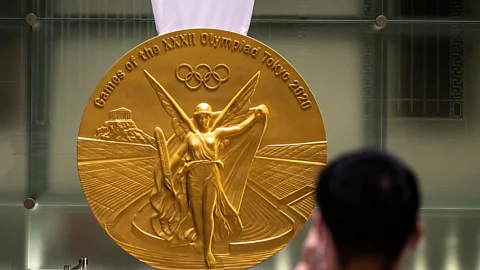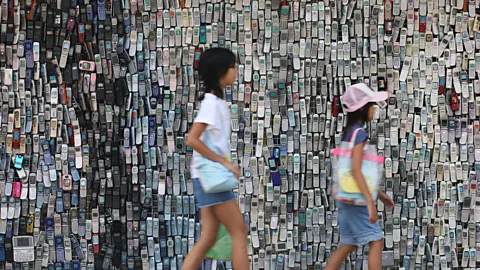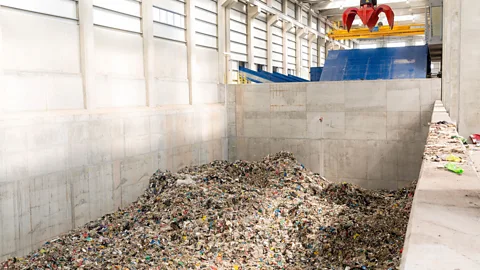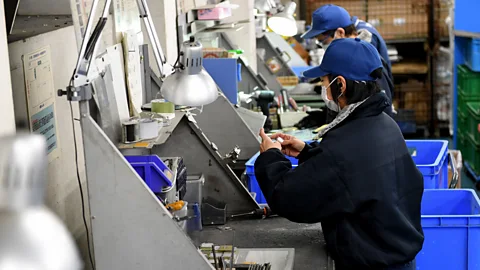The surprising source of the Tokyo 2020 Olympic medals
 Philip Fong/AFP/Getty Images
Philip Fong/AFP/Getty ImagesIn an act of 21st century alchemy, Japan is turning obsolete electronics into Olympic and Paralympic medals. Can their ambition show us how to deal with e-waste?
What goes into an Olympic medal? A digital picture of a nine-year old girl smiling by a pool after she won her first regional tournament. That late-night chat with Sebastian, the basketball coach, to schedule the next day’s training. Multiple alarms at 4:15, 4:20, 4:25… so the snooze button will not prevent a young surfer from riding her best wave at sunrise, when the tide is right. A call from dad: “You’ll do great, love,” he says.
Success probably carries these connotations and many more if you are a professional athlete. For champions at the Olympic and Paralympics Games at Tokyo in 2020, however, the memories stored in their medals will not only be their own.
The metal hanging from their neck will come from mobile phones used by millions of Japanese, as part of the host country’s program to use only recycled materials in the minting process. The Tokyo organising committee aims to produce their 5,000 medals with gold, silver and bronze retrieved from electronic waste.
This way, the nine-year old might be a boy from Osaka who never reached pro even if the winner is a 20-year old Ukrainian table tennis player. The basketballer might be an amateur from Kobe who pays his bills as a plumber. The alarms might have woken up a Tokyo accountant when she visited Costa Rica to surf several years ago. The dad could be, of course, any dad.
All these memories, once stored in smartphones and other handheld devices, would take the round glossy shape of an Olympic medal, one of the most coveted prizes in sport.
You might also enjoy:
Electronic waste (e-waste), discarded products with a battery or a plug, is the fastest growing part of the world's domestic waste stream, and a highly toxic one, but it is also considered an ‘urban mine’, a gold vein hidden in plain sight, as electronics contain profitable metals waiting to be retrieved.
The Tokyo 2020 organising committee saw this opportunity and invited citizens to donate their mobiles and other gadgets. This way, households dispose their obsolete or forgotten electronics safely and medal manufacturers get a steady supply of resources.
In little more than a year since the project’s launch last April, the organisers have retrieved 16.5kg (36.3lbs) of gold (54.5% of the 30.3kg target) and 1,800kg (3,960lbs) of silver (43.9% of the targeted amount of 4,100kg or 9,020lbs ). The target for bronze, 2,700kg (5,940lbs) has already been reached. “This initiative represents an opportunity for people from all over the country to participate in the Tokyo 2020 Games,” Masa Takaya, a Tokyo 2020 spokesperson, tells BBC Future in an email statement.
 Alamy
AlamyThe project also provides hope in our struggle with e-waste. Our addiction to electronics risks drowning our societies in discarded gadgets. UN data says that the world generated 44.7 million tonnes of e-waste in 2016, a figure that grows between 3 and 4% yearly.
If you load all that waste into 18-wheel 40-tonne trucks, you could fill around 1.23 million of them, enough to pack a two-lane street between Paris and Singapore. By 2021, that figure could be more than 52 million tonnes.
Most of this waste never reaches collection centres, either in Japan or elsewhere. A UN report estimates that only 20% of discarded electronics is recycled; the rest is either dumped in landfills, passed along country lines to be reused (usually from richer countries to those less developed ) or forgotten in our drawers.
This is not only foolish from an ecological standpoint, as toxic materials found in electronics pollute our soil and water if they are not treated properly, but it looks like a missed chance for countries with few mines of their own.
“Japan is a resource-poor country and they have no other opportunity to retrieve valuable and scarce resources than by harvesting from their waste,” says Ruediger Kuehr, an e-waste expert at the UN University and co-author of the UN report. In some occasions, the value of one tonne of materials extracted from urban mining is one hundred times higher than the same tonne from traditional ore extraction, says Maria Holuszko, assistant professor at the University of British Columbia (UBC).
 Alamy
AlamyJapan's untold stories
Welcome to BBC Future Now's Japan season, in which we explore the country's most exciting medical, technological, environmental and social trends.
Coming up, you can read:
Why 'flammable ice' may solve an energy crisis
How Japan made fatherhood sexy
The secrets of Okinawa's superagers
... and many more.
While you can get three or four grams of gold for each tonne of ore extracted from a mine, one tonne of mobile phones can provide up to 350g.
This not only deals with the e-waste, but it also means less metal extraction from mines. Holuszko estimates that urban mining could meet between 25 and 30% of the global demand for gold.
“Statistics tell you right away that there is a business opportunity,” says Holuszko, who co-founded UBC’s Urban Mining Innovation Centre.
This is not the first time Olympic medals will contain recycled materials. Almost 30% of the silver used for Rio 2016 came from leftover mirrors, waste solders and X-ray plates and 40% of their copper, used for the bronze medals, came from mint waste. The 2010 Vancouver Winter Olympics symbolically used around 1.5% of recycled metals, although they came from an urban mine in Belgium.
Tokyo 2020’s effort is unique in two regards. It aims to get 100% of the metals from recycled material and it only accepts e-waste from Japanese households.
Even with these limitations, the project has taken off. By June 2018, telecom shops had collected 4.32 million used mobile phones donated by the public, while municipal authorities received around 34,000 tonnes of small electronic devices.
 Getty Images
Getty Images“I brought five old phones that I wasn’t using,” says an elderly Japanese woman in a video produced by the Japanese Ministry of Foreign Affairs. “It’s nice to feel I’m a part of the Games like this.”
From 35 to 40 mobile phones you could salvage around one gram of gold, which is one-sixth of the 6g the International Olympic Committee insist on for each of the gold medals. (The remaining metal in the most prestigious award is, in fact, silver.)
The quest to get those grams has received plenty of attention, with previous medallists donating their old gadgets and even former British Foreign Minister, Boris Johnson, pitching in when he visited Tokyo in 2017.
Despite this, the medal project’s success will likely be symbolic – and it will only address one of the games’ enormous sustainability challenges.
The electronics collected so far represent less than 3% of Japan’s yearly e-waste output, which the UN estimates at around two million tonnes. Another issue to consider is the fate of the ‘non-metal part’, which comprises pretty much everything beyond the enticing couple of grams of gold, palladium or other valuable metals in each device. “If we just recover metals and dump the rest into a landfill, they can cause a lot of pollution,” says Holuszko, whose work at UBC focuses partly on finding a way to fully-recycle a smartphone.
The Tokyo 2020 organising committee is only receiving gold, silver and bronze (a metallic alloy of copper and zinc) from its recycling partners, so the fate of the non-metal part is unclear even to them. The Games’ spokesperson said they had “heard that some companies are recycling the remaining elements using regular processing methods” but could provide no assurances.
 Getty Images
Getty ImagesThe questions pile-up as we look into what the future looks like in our increasingly electrified societies. Kuehr estimates that global e-waste output could easily double to 80 million tonnes within a few decades.
We should change how we understand electronics, he says. A way out is to stop purchasing and owning devices, not as analogue hermits but as digital nomads. “Instead of buying the phone itself, why don’t we consider buying the services they provide?” he asks.
The system would look a lot like leasing, with the big difference that you never get to own the product. Apple or Samsung would provide the service of ‘mobile communications’ or ‘electronic home dishwashing’ and customers would pay for that. If a device breaks, companies would get you a replacement while they repair it. When gadgets finally reach the end of their lives, the businesses who own them would ideally feed their materials back into the production process.
There are dozens of challenges that would need to be overcome, but also around 80 million tonnes of waste that are calling for an ambitious solution. Perhaps the change could start in Japan itself, home of electronic giants like Hitachi, Mitsubishi, Panasonic and Sony, says Kuehr, who did his post doctorate in Tokyo.
That is, however, an ambition that looks beyond the scope of the Tokyo 2020 Medals Project and would likely require a robust international strategy. For now, 5,000 medals made with recycled metals looks like a decent place to begin with.
“I’m quite happy to see that Japan is providing proof that urban mining is feasible,” says UBC’s Holuszko.
--
Diego Arguedas Ortiz is a science and climate change reporter. He is @arguedasortiz on Twitter.
If you liked this story, sign up for the weekly bbc.com features newsletter, called “If You Only Read 6 Things This Week”. A handpicked selection of stories from BBC Future, Culture, Capital, and Travel, delivered to your inbox every Friday.

